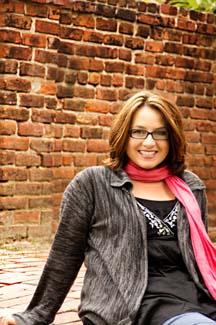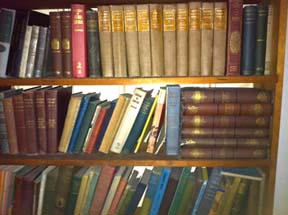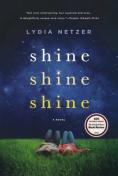BKMT READING GUIDES
Shine Shine Shine
by Lydia Netzer
Paperback : 336 pages
10 clubs reading this now
7 members have read this book
A New York Times Notable Book!
"Over the moon with a metaphysical spin. Heart-tugging…it is struggling to understand the physical realities of life and the nature of what makes us human….Nicely unpredictable…Extraordinary." ?Janet Maslin, The New York Times
When Maxon met Sunny, he ...
Introduction
A New York Times Notable Book!
"Over the moon with a metaphysical spin. Heart-tugging…it is struggling to understand the physical realities of life and the nature of what makes us human….Nicely unpredictable…Extraordinary." ?Janet Maslin, The New York Times
When Maxon met Sunny, he was seven years, four months, and eighteen-days old. Or, he was 2693 rotations of the earth old. Maxon was different. Sunny was different. They were different together.
Now, twenty years later, they are married, and Sunny wants, more than anything, to be "normal." She's got the housewife thing down perfectly, but Maxon, a genius engineer, is on a NASA mission to the moon, programming robots for a new colony. Once they were two outcasts who found unlikely love in each other: a wondrous, strange relationship formed from urgent desire for connection. But now they're parents to an autistic son. And Sunny is pregnant again. And her mother is dying in the hospital. Their marriage is on the brink of imploding, and they're at each other's throats with blame and fear. What exactly has gone wrong?
Sunny wishes Maxon would turn the rocket around and come straight-the-hell home.
When an accident in space puts the mission in peril, everything Sunny and Maxon have built hangs in the balance. Dark secrets, long-forgotten murders, and a blond wig all come tumbling to the light. And nothing will ever be the same.…
A debut of singular power and intelligence, Shine Shine Shine is a unique love story, an adventure between worlds, and a stunning novel of love, death, and what it means to be human.
Shine Shine Shine is a New York Times Notable Book of 2012.
Editorial Review
Amazon Best Books of the Month, July 2012: What is a "normal" life? For Sunny, it means wearing a blond wig (she’s been bald since birth), medicating her autistic son (who wears a helmet because he bangs his head against walls), and teaching her brilliant but socially clueless husband, Maxon, how to interact with other humans (they whiteboard equations so he knows how to respond to compliments). When Sunny’s wig falls off during a car accident, exposing her bare head to her neighbors for the first time, she starts to realize that this "normal" life she has built is actually a huge problem. Everything about Shine, Shine, Shine is charmingly odd, full of feeling, and beautifully written. Lydia Netzer has created a cast of characters so unique and surprising, you want to follow their story long after it ends. These are real people making real choices about their lives--even if those lives are different from everyone else’s. This is a superb debut. --Caley Anderson
Books to Read in Trees: An Amazon.com Exclusive Essay from Lydia Netzer

When I was a child, I read in a tree.
My favorite reading spot was 20 feet above the ground, in a natural seat formed by the branches of an enormous pine tree. I often scuffed my knees on the climb up, book shoved into my waistband, fingernails dirty with the sap I absently picked at while I read. Raised by two school teachers with jobs in Detroit, I only had access to my reading tree during summer vacations.

In Detroit, we lived in a condo, we went to the library, and I read material the library deemed appropriate for children: Judy Blume, Marguerite Henry, Madeleine L'Engle, Susan Cooper. In Pennsylvania, in the summer, we lived on this isolated old family farm, and I read the only material my mother deemed appropriate for humans: 19th century British literature.
It was tough getting those lousy hardbacks to stay in my waistband all the way up the tree, but I managed to stick it out through George Eliot, most of Dickens, Ivanhoe, and the Brontes. American lit was off the table, even the stuff from 100 years ago. Harpoonists sweating half-naked over oars? Lusty puritans cavorting in the northern woods? Extracted heart throbbing in the baseboards? Forget it. I guess my mother figured out that if I could wring any damaging sexual content out of The Mayor of Casterbridge, or if I still wanted to procreate after stomaching the gloom of The Mill on the Floss, there was nothing she could do.

I know it wasn't all prudishness. She was proud of my willingness to put away the horse books and sci-fi for the summer, and delve into something toothier and challenging, that I could only wrestle with in the absence of school, and the city. In the company of trees and the occasional woodpecker I could pine for those lordlings and bold orphans, and fear consumption and workhouses and the disapproval of maiden aunts.
Now I've sent my son and daughter up that same tree, with Percy Jackson novels or American Girl books tucked into their belts. I did not inherit the wary eye with which my mother viewed books written by Americans, but I did take away the sense that for me, summers are reserved for braver reading. Summers are for books that stretch you, for cracking open the unknown, and having the mental space to immerse.
This summer, I will not be reading Thackeray, okay? Sorry, mom. I'll now admit that reading The History of Henry Esmond made me want to walk into the sea in despair. But this summer when I pack to go to the farm, I'll be loading up with books that are big and unfamiliar, like Ben Marcus' The Flame Alphabet, books I need space to comprehend, like Robert Goolrick's Heading Out to Wonderful, books that are best devoured in the big uninterrupted chunks of time that only vacation from regular life can give me, like Chris Cleave's Gold. And I might just climb that reading tree myself this year, to see what big ideas may linger.
Excerpt
1Deep in darkness, there was a tiny light. Inside the light, he floated in a spaceship. It felt cold to him, floating there. Inside his body, he felt the cold of space. He could still look out the round windows of the rocket and see the Earth. He could also see the moon sometimes, coming closer. The Earth rotated slowly and the spaceship moved slowly, relative to the things that were around it. There was nothing he could do now, one way or the other. He was part of a spaceship going to the moon. He wore white paper booties instead of shoes. He wore a jumpsuit instead of underwear. He was only a human, of scant flesh and long bone, eyes clouded, and body breakable. He was off, launched from the Earth, and floating in space. He had been pushed, with force, away. ...
Discussion Questions
1.Is Emma a good mother?2.What might Sunny’s life have been like if she had
never gotten pregnant, and therefore never felt the
need to put on the wig?
3.Was Sunny culpable for Paul Mann’s death?
4.Do you agree with Rache that everyone has their
baldness, or do you think those perfect housewives
actually exist?
5.Perhaps Maxon was better off without his dad,
but do you think Sunny was negatively affected by
growing up without a father?
6. If you wrote a letter to your child, to be read only
after your death, what would it say?
7.The book suggests that raising any child is like
programming a robot, with scripted replies, ritual behaviors, and reinforced responses. Do you agree?
8.Emma did not want Sunny to marry Maxon. Why?
And was she right?
9.Do you think that Sunny seriously considered
Les Weathers as a replacement for Maxon, if he
should die?
10. Where would you prefer to live: the perfect house
in a respectable neighborhood in a historic city, or
a strange farmhouse in the wilds of an eccentric
rural county?
11. What changes have you made to fit in to a new
role you’ve taken on, whether it’s parenthood, a
new job, or a marriage?
12. Do you think that motherhood fundamentally changes a woman, or do you think it’s possible to hold on to the person you were before kids?
13. Why did Emma bring Sunny back to America?
14. How is Maxon flawed as a husband? How is he
a good spouse?
15. Could there be someone better for Maxon than
Sunny?
16. In her worry that marrying Maxon would ruin
Sunny, should Emma have wondered if marrying Sunny would be the best thing for him?
17.Is it Maxon’s fault that Bubber is the way he is?
18. Did Sunny make the right decision in taking
Bubber out of his special school and off his
medications?
19. How does a woman’s relationship with her
mother change when she becomes a mother
herself?
20. Sunny felt she had to let her mother’s ship fall
past the horizon before her own could set sail.
Can a woman truly become “the mother” while
her own mother is alive?
21. Although Sunny’s mother, Emma, was the
epitome of acceptance, and encouraged her to
go without a wig while she was growing up,
why do you think Sunny started wearing them?
22. Why did Emma turn her husband in to the
communists when they lived in Burma, and
was this revelation necessary for the plot and
coherence of the book?
23. In pages 291–93 of the book, during Sunny’s
labor with Bubber, she at first thinks she over-hears her mother and Maxon having a conversation about Maxon going to the Moon, but later Sunny thinks she must have made up the conversation. Do you think this conversation did occur?
Why or why not? If you think it did occur, what do
you think motivated Sunny’s mother to make the
suggestion to Maxon that he complete his mission
to the Moon?
24.How is Sunny’s decision to abandon her wig after
her car accident related to her decision to take
Bubber off of his medication?
Weblinks
| » |
Reading Guide from the publisher
|
| » |
Lydia Netzer's web site & blog
|
| » |
Follow Lydia Netzer on Facebook
|
| » |
Follow Lydia Netzer on Twitter
|
Book Club Recommendations
Recommended to book clubs by 3 of 6 members.
Book Club HQ to over 88,000+ book clubs and ready to welcome yours.
Get free weekly updates on top club picks, book giveaways, author events and more








